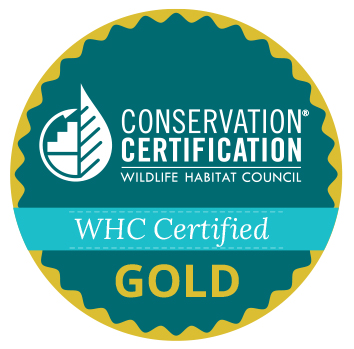Ashland receives gold at all wildlife habitat council sites in 2023
Ashland was recognized for contributions to environmental conservation and wildlife habitat preservation by the Wildlife Habitat Council (WHC).
In 2022, Ashland continued our commitment to biodiversity enhancement and conservation by continuing to improve multiple projects across eight sites within our Wildlife Habitat Council (WHC) program portfolio.
Ashland’s WHC program has eight certified sites with five sites achieving gold certification and two sites certified silver. Ashland continues to combine conservation and corporate sustainability goals with remediation efforts and was recognized by WHC at the 2023 Conservation Conference as a finalist for the Bats and Formal Learning projects at the Wilmington research center.
The following certifications were received:
| site | location | certification status |
|---|---|---|
| Research Center (Corporate Campus) |
Wilmington, DE | gold |
| Old York Road | Burlington, NJ | gold |
| Former Brunswick Plant | Brunswick, GA | gold |
| 009 Landfill | Brunswick, GA | gold |
For 30 years, WHC has been promoting and certifying habitat conservation and management on corporate lands through partnerships and education. WHC Conservation Certification® currently recognizes 700 corporate conservation programs in 47 states and 28 countries.
Research Center
 |
In 2023, the Research Center program was recognized at the WHC Conservation Conference as a finalist for the Bats Project Award and winner of the Remediation Project Award. Their efforts included establishing a landscaped pollinator garden and monitoring five species across managed and adjacent habitats, with a thriving grassland habitat supporting wildlife like bats and species of conservation concern such as the Baltimore Oriole and Common Flicker. This recognition underscores the Research Center’s dedication to environmental stewardship and biodiversity conservation. |
Old York Road
 |
In 2023, the Old York Road site was highlighted in a WHC Member Success Story for its robust habitat and species programs, including a partnership with Rutgers University for scientific data collection on its 7-acre former landfill. New plant and animal species were discovered on-site, and 32 nestlings from three native songbird species successfully fledged from grassland nest boxes, showcasing effective preventative measures against parasitism, pests, and predation. These successes indicate a positive impact on target species and the overall diversity of native wildlife in the area. |
Former Brunswick Plant
 |
The Former Brunswick Plant boasts grasslands and forest habitats supporting diverse native wildlife like birds, mammals, and pollinators. In 2023, changes on-site altered the grassland habitat, yet signs of nesting persisted in avian boxes, and solitary pollinators used the pollinator box. Adaptive efforts included updating the mammal camera for ongoing wildlife observations and post-2023 recommendations for bird box improvements to enhance fledging success rates, all crucial for maintaining strong habitat and species programs for certification. |
009 Landfill
 |
The Former 009 Landfill program comprises freshwater ponds, wetlands, and a grassland meadow supporting monitoring projects for avian, mammal, pollinator, and reptile & amphibian species. In 2023, a new pollinator box attracted leaf cutter bees for nesting, showcasing effective habitat additions. Planned adaptive management activities, |
read more >



